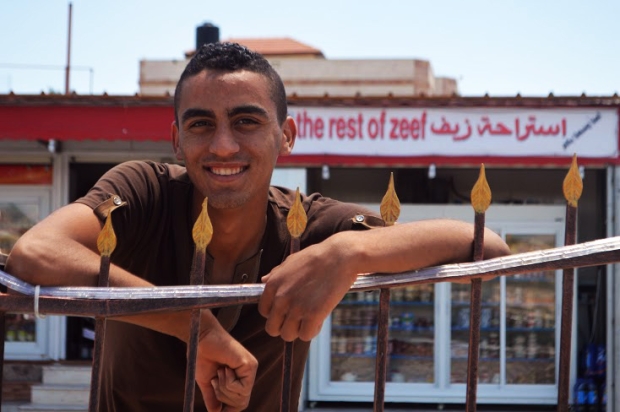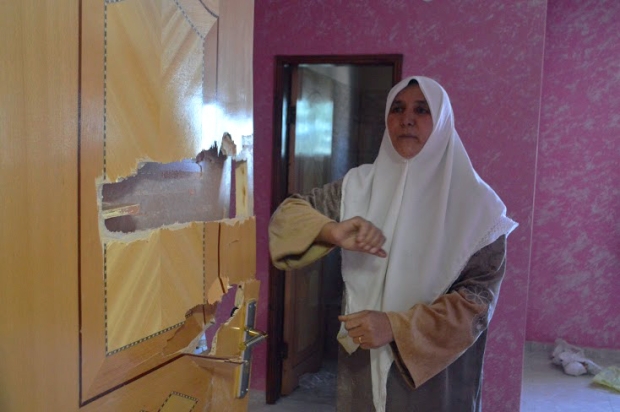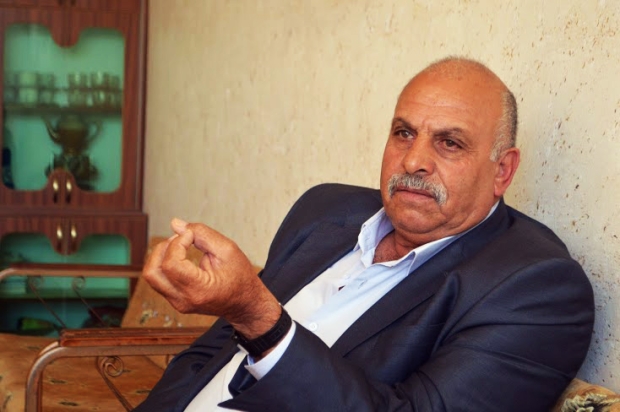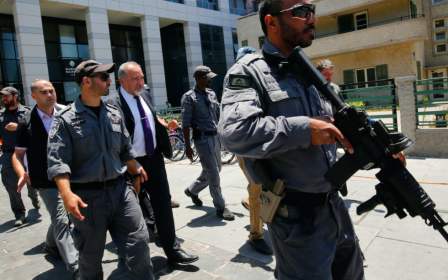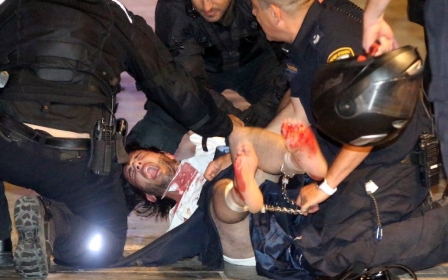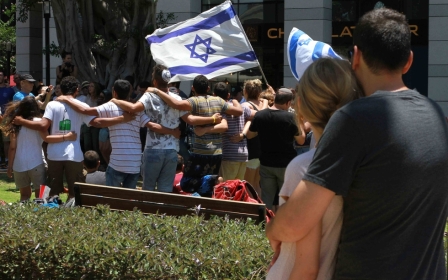Israeli forces impose ‘collective punishment’ on West Bank village
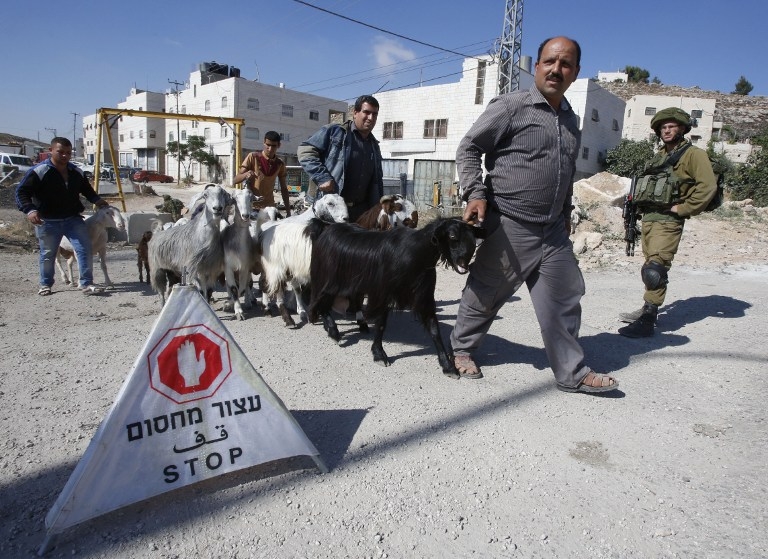
YATTA VILLAGE, West Bank - Stacks of cement slabs block every entrance to this village in the southern occupied West Bank district of Hebron. Israeli soldiers began blockading the town during the early hours of Thursday, after a mass shooting in Tel Aviv committed by two Palestinian residents of the town.
Four Israelis were killed in the attack and 16 wounded. While both Palestinian gunmen were captured, Israeli forces still closed off Yatta, home to about 65,000 Palestinians.
Israeli authorities also revoked travel permits granted to 83,000 Palestinians from the West Bank and Gaza Strip for the Muslim holy month of Ramadan, and announced that all attempting to enter Israel from the occupied West Bank would be barred until Sunday at midnight, with exceptions only for “medical and humanitarian cases".
By Thursday afternoon, less than 24 hours after the attack, the entire town was sealed, with all roads leading in and out closed off.
Issa Shatay, 18, works at his family’s market, adjacent to one of the closed entrances. While the market was booming with customers during the first few days of Ramadan, on Thursday residents were too scared to venture out to the market, where Israeli soldiers were stationed on the other side of the cement blocks.
“They came and put the blocks here around two in the morning yesterday, and after that, there was no business,” Shatay told Middle East Eye, as a handful of workers passed by on foot.
“The other side of those blocks is still technically Yatta,” one of the men pointed out. “We were dropped off at another blockade on the other side of those homes. It’s not fair but that is the occupation for you.”
When asked if they want the blockade lifted, they laughed. “This is the life,” another man said with a shrug.
The blockade may be business as usual in the occupied West Bank, where dozens of villages have been besieged since the beginning of the upheaval last October, but it may also "be prosecutable as a war crime", according to Simon Reynolds, legal advocacy coordinator at Bethlehem-based Badil Resource Center for Palestinian Residency and Refugee Rights.
“Israel’s application of sanctions against the entire population of Yatta in response to acts allegedly conducted by two residents is not only morally reprehensible, but also entirely unlawful,” Reynolds told MEE. “The prohibition on collective punishment is strict and unequivocal under international humanitarian law.”
MEE contacted an Israeli security forces spokesperson on Friday for response to Reynolds' comments, but had not received any by the time of publication.
On Friday morning, there was one dusty farm path still available to those willing to take the risk, but by midday Israeli soldiers had blocked the last lifeline to the outside world.
House raids
Since the siege of Yatta began, Israeli forces have also raided homes and detained dozens of young men.
Rusayda Zayn, 53, said Israeli forces came for her son on Thursday night. Younis Zayn, 21, was wanted for being friends and neighbours with Khalid Makhamera, one of the Tel Aviv gunmen.
Israeli soldiers reportedly gathered all seven male residents of the building, handcuffing them and laying them on their stomachs in the street outside her home while other soldiers ransacked each room in the building, Zayn said.
Every door in the three-story building had been kicked in or broken.
“The soldiers didn’t knock, they didn’t tell us what they wanted or announce themselves, they just descended on the house all at once," she said. "The doors are all broken because we didn’t have time to realise they were here and open them before they broke them all.”
Because her son was not home that night, Zayn said Israeli forces detained three other men, holding them until Younis turned himself in a few hours later.
“They held the others hostage until my son was contacted,” Zayn said.
A few houses away, the mother of 22-year-old Khalid Makhamera, one of the shooting suspects, along with his cousin, Mohammed Makhamera, 21, sat in a room, as if in mourning, with a dozen other older women.
“I spoke with him last around two in the afternoon before it happened,” his mother said, referring to the shooting. “He said he would be late for dinner and that he was sorry but not to worry, and after that when I tried to call, his phone was off. We found out what happened from the news.”
Khalid’s mother said her son and his cousin were not affiliated with any political group.
On Thursday afternoon, Israeli forces came to the homes of both Khalid and Mohammed and took measurements for home demolitions. Four other families also live in the home where Khalid lived, and will consequently have their homes destroyed as well as part of the punitive demolition.
“I don’t care about any of that,” Khalid’s mother said. “I am just worried for Khalid, I wish they would have killed him instead of imprisoning him, he will die 100 deaths every day in their prison, it is more painful than death.”
Worst blockade in months
The mayor of Yatta, Mousa Makhamera, who shares a last name but not family relations with the two shooters, told MEE that the blockade of his village is the worst the West Bank has seen in recent months.
“With it being Ramadan and time for kids to take their final exams, this siege is affecting our most vulnerable residents physically and psychologically,” Makhamera said.
“There are kids inside the village who go to school outside, and kids outside the village who go to school here, and now so many of them are missing their final exams, which the older ones have been studying so hard for.”
The mayor said local people did not blame Khalid and Mohammed Makhamera for their hardships.
“It seems the majority of the young people who are committing these attacks are apolitical, bright Palestinian youths,” he said.
“But they have no hope, no future, they see the dire situation of their parents and elders and they see how long this occupation has continued without hope for a political solution and they are questioning if they have any future at all and they are angry. Collective punishments like this blockade are only encouraging this thought process and making things worse.”
“The only way to end the violence is to end the occupation,” he said. “It is the occupation that is at fault; there is no other way to end this.”
New MEE newsletter: Jerusalem Dispatch
Sign up to get the latest insights and analysis on Israel-Palestine, alongside Turkey Unpacked and other MEE newsletters
Middle East Eye delivers independent and unrivalled coverage and analysis of the Middle East, North Africa and beyond. To learn more about republishing this content and the associated fees, please fill out this form. More about MEE can be found here.


